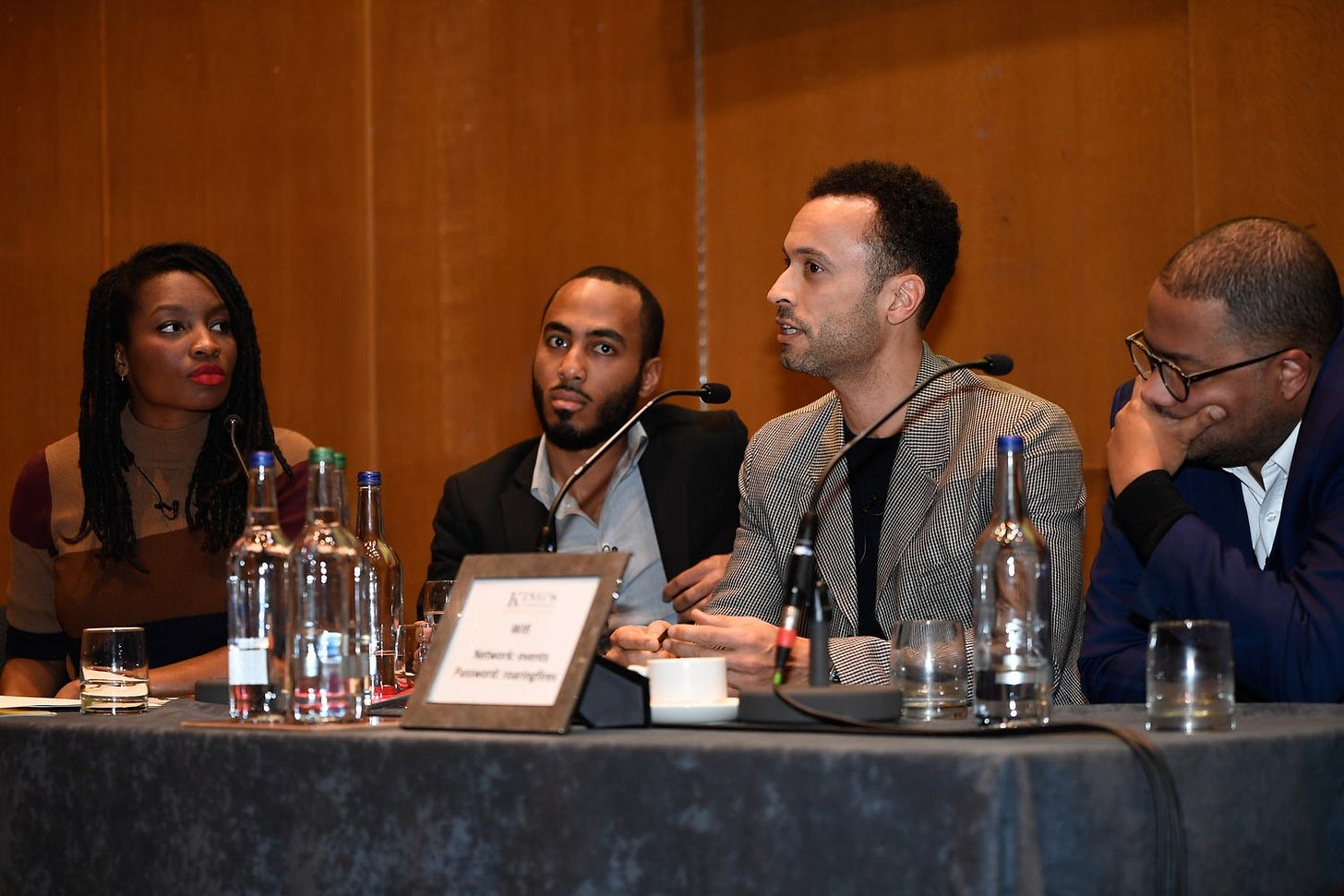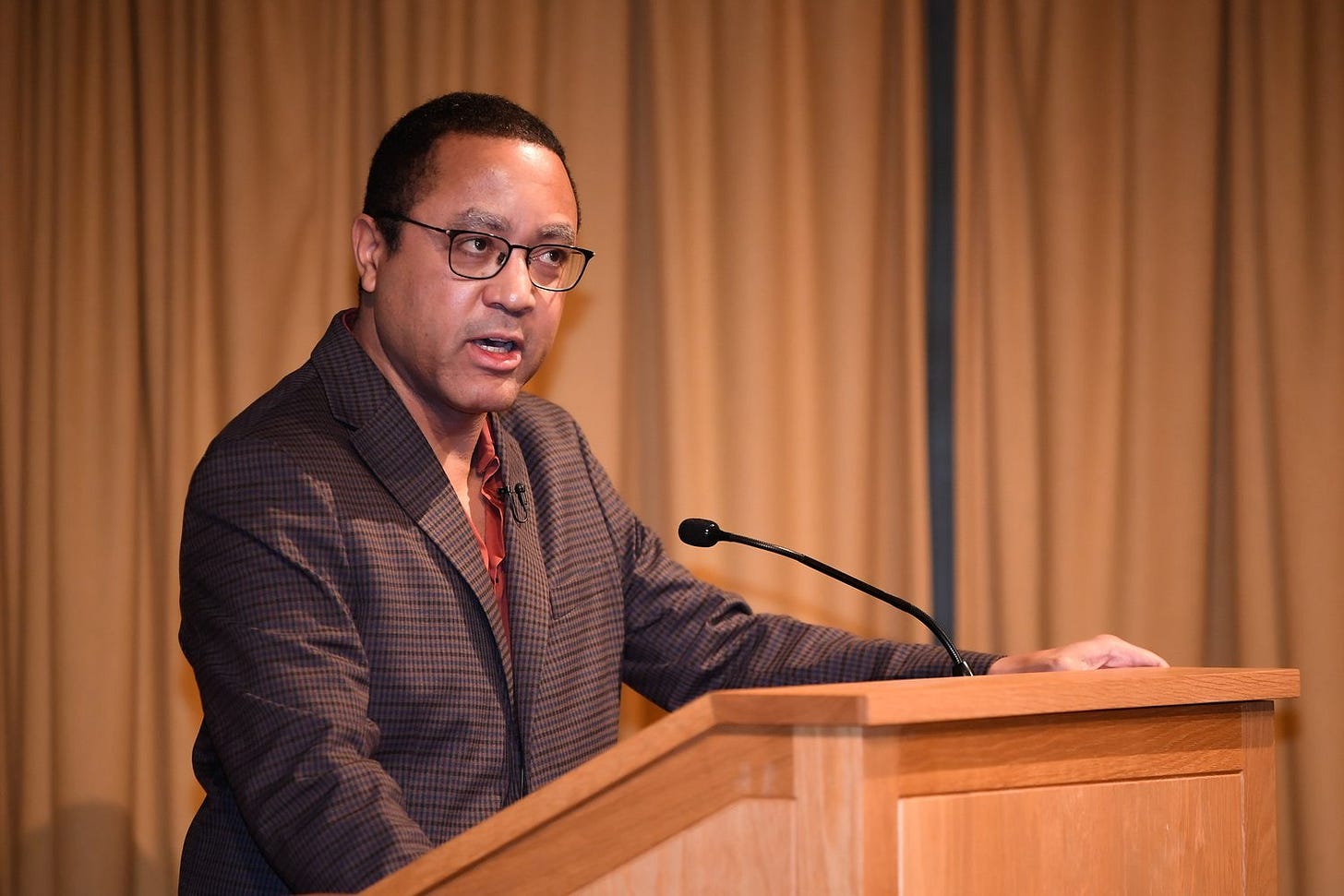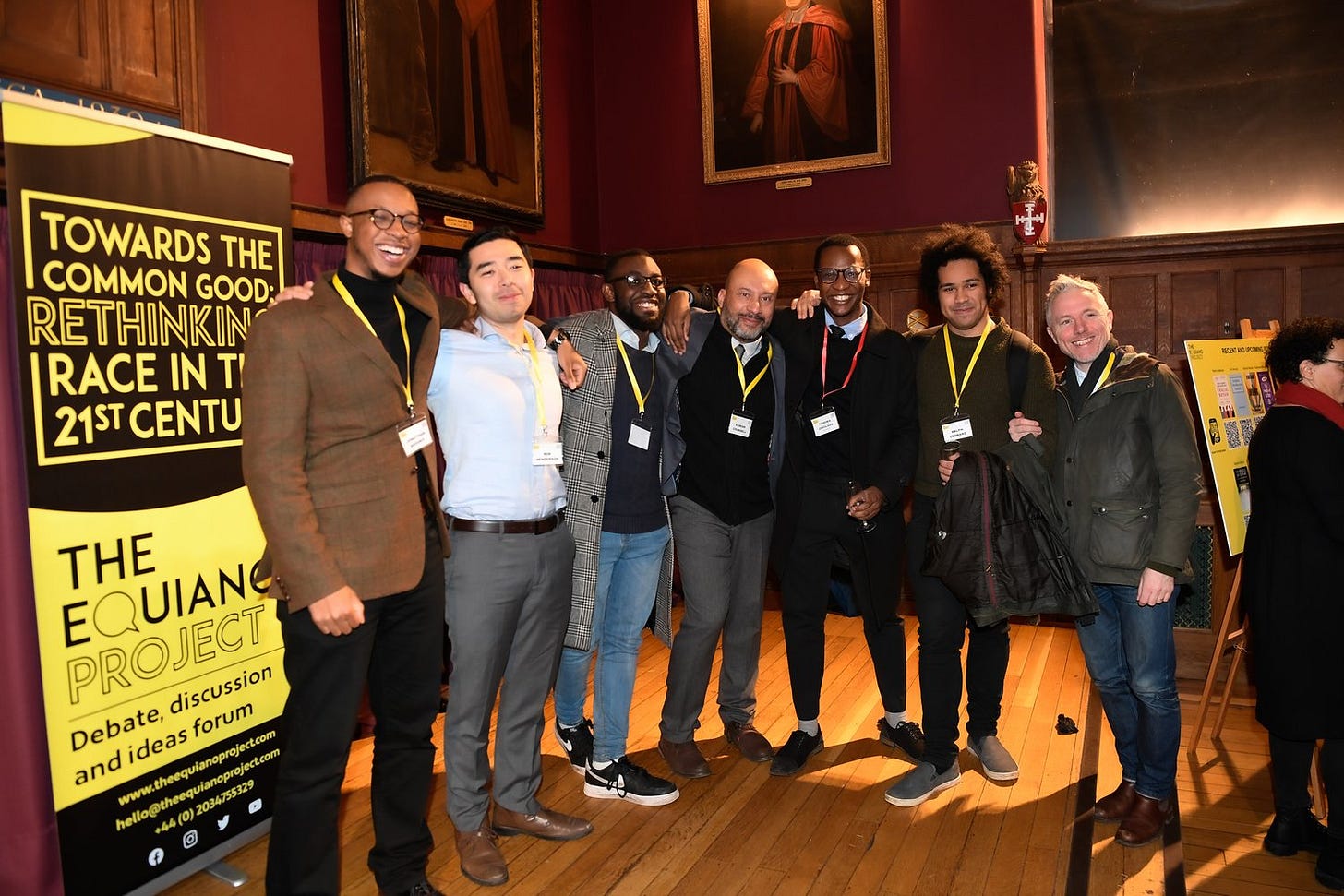Living Colour
Notes on the Equiano Project
At “Towards the Common Good: Rethinking Race in the 21st Century”, a conference organised by the Equiano Project, Cambridge, 13 January 2023. From left: Inaya Folarin Iman, Coleman Hughes, Thomas Chatterton Williams, Stephen Bush. Photo: Stuart Mitchell. More pics here.
A midweek Ruffian! I know, crazy times. I’m splitting your regular offering in two this week. Today: thoughts inspired by a conference I attended last week. Then, on Saturday, notes on what I’ve been watching on TV and at the cinema, plus the usual juicy linkage.
I’m not someone whose blood quickens at the thought of watching panel discussions and wearing a lanyard but I was happy to be invited to the Equiano Project’s colloquium on race, hosted by Cambridge University. The list of speakers was just too interesting to miss. It included writers and thinkers I’ve been following for years (actually in one or two cases - damn - decades). I’m delighted to have made it. It was more stimulating, memorable and fun than a conference has any right to be.
The conference’s prime mover, Inaya Folarin Iman, convened a fascinating group of academics, civil servants, education leaders, journalists and business executives. Most were non-white. Some of the best-known and most impressive thinkers on race in America came over for the event and swapped thoughts with their British counterparts. Political outlooks ranged from Marxism to libertarianism to conservatism and everything in between. There was an array of accents and speaking styles (those Americans, my God, how did they get so good at talking?). There were lots of scarily smart women and men in their twenties, and some impressively vigorous thinkers in their seventies.
What did they have in common? First, a dissatisfaction with what Adrian Wooldridge, in his report on the event, calls, “An orthodoxy that was hatched by US academics and activists [which] has taken over the discussion of race not only in British universities but in the civil service and the corporate sector.” It wasn’t just that, though. They also shared seriousness of purpose, openness to ideas, flexibility of mind, respect for evidence, joy in erudition, and a sense that anyone who doesn’t have a sense of humour should not be taken too seriously.
If I tried to capture all the good stuff that went down last week this post would be ten times as long and even more inadequate than it is. So instead I’m going to lay out a few thoughts on what I think this loosely aligned bunch stands against, and what they might be for. What follows is my responsibility, however, and shouldn’t be taken to represent anyone’s opinion except my own - in fact, I’m sure that some of the Equiano attendees will disagree with at least some of it, at least I hope so.
The Problem With ‘Anti-Racism’
In the last few years a new way of thinking about race, imported from America, has become generally accepted among elites: government, the arts, charities, academia. ‘Anti-Racism’ has succeeded not because it is philosophically coherent, or because it reflects the views of minorities at large, but because its moral logic is simple and superficially compelling, and its catchphrases are easy to learn and recite. Once interrogated, it is soon revealed as brittle and contradictory. But most leaders and managers don’t want to have to think very hard about this topic, somewhat understandably, and are wary of being criticised for saying the wrong thing. So they cleave to whichever norm is most visible among their peer group in the media and on LinkedIn.
What follows is a critical but not, I don’t think, unfair summary of Anti-Racist orthodoxy, which is articulated at length in its canonical text, Ibram X. Kendi’s How To Be an Anti-Racist.
[Note: one reason for the success of the new Anti-Racism is the brilliance of its branding. If you’re against Anti-Racism, what does that make you, huh? I’m going to call it AR here, for the sake of brevity and to emphasise that it’s possible, indeed preferable, to be anti-racist without being Anti-Racist.]
AR argues that disparities in economic or social outcomes among racial groups are always and everywhere caused by racism. If a company’s staff does not represent the racial profile of the general population - racism. If black children are doing worse at school than white children - racism. If minorities suffer disproportionately from Covid-19 - racism. If Meghan is more unpopular than Kate - OK you get the idea.
AR says that these disparities are not caused by gaps in income and wealth (or if they are, then those gaps are caused by, you guessed it). They are not caused by differing histories of immigration, or by cultural variation between ethnic groups, or by sheer randomness (however you slice and dice a society, one certainty is the resulting groups will not be equal on every measure). No. Every disparity is rooted in racism, specifically the racism of white people.
The solution, therefore, is action taken by white people in order to close the gap, using any means necessary. If black students are not performing as well as white students on standardised tests, then standardised testing should be abolished (and along with it, the notion of a common standard). Levelling a playing field is not enough; if a team isn’t winning they need to given an advantage, since what matters is not equality of opportunity but equity of wealth and representation. Achieving this requires the state and other employers to treat people differentially on the basis of their race. These ‘equity’ policies are not merely abhorrent necessities; contingent and temporary measures to be abolished as soon as equal outcomes have been achieved. They are restitution for historic harm.
There are problems with this approach. One is that, in practice, it requires inverting our common sense notion of justice. As one Equiano speaker pointed out, what most people mean by “justice” is fair process. Justice is not a guarantee of equal results; it means everyone playing by the same rules, on the way to those results. AR activists have it the other way around: they rig the rules to achieve a predetermined result.
At the conference, Glenn Loury spoke eloquently against the AR theory of justice. It fails to conceive of black people as true equals. It deprives them of agency, fixing them as passive victims of historic oppression. It is inherently pessimistic, since it implies that they can never succeed inside a racist system (notwithstanding copious evidence to the contrary). It is patronises, demeans and depresses those it claims to help. “Equal representation is not equality,” Loury said. “‘Equity’ means, ‘You will not be equal even if you get what you ask for.”
A further problem, much discussed at the conference, is that AR draws false conclusions from the data on social disparities. In Britain, there are much bigger differences between different ethnic minority groups than there are between the non-white and white populations. Those from Indian and Chinese backgrounds far outstrip other groups, including whites, in education; British Indians are more likely to be in the top fifth of the income distribution than whites; Bangladeshis and Pakistanis far less so (though Bangaldeshis have been making remarkably rapid progress in recent years). How much explanatory power does racism have for any of this?
One much-cited data point is that black kids are more likely to be excluded from school than white kids. Racism, right? At the conference, Tomiwa Owolade noted that this conceals another data point: that black African pupils are less likely to be excluded than white pupils, while black Caribbean kids are three times as likely to be excluded as white kids, thus raising the average for the only-ever-tenuously-meaningful category of “black pupils”. (The reasons for the lagging relative performance of black Caribbean kids in schools are complex, and the average tells us nothing about any one black Caribbean girl or boy. The point is that to attribute such outcomes to racist schools is to dangerously miss the point.)
There is a cultural and (pseudo-)psychological dimension to AR too, exemplified by Robin DiAngelo’s White Fragility. The rhetorical mode here is one of atonement. White people must look within themselves, confront the racist within, and do penance (do the work). The implication is that the answers to the problems of black people lie, ultimately, with white people. It should not be surprising that so many educated white people have enthusiastically adopted this narrative. It makes us the main character in the drama, a character both powerful and virtuous. It means we get to talk about ourselves a lot and feel really good about doing so. Ayishat Akanbi has remarked, mordantly, that Black Lives Matter might be better named White Perception Matters.
It is hard to analyse AR as an ideology, since it is as much vibe as coherent belief system - and a rather bleak, loveless and punitive vibe at that. It conceives of society as essentially a power game in which white people struggle to maintain dominance over everyone else. AR makes great play of racism being “structural” or “systemic” rather than simply a question of individual behaviour or disposition. Well, sure. It’s indisputably true that the legacy of racial discrimination remains a factor in differences between groups (and is there anyone alive who doesn’t believe that racist attitudes are socially inherited and spread?). But one logical conclusion of this premise should be that we are slower to condemn individuals for racist behaviours. Which is why, of course, whenever an individual is accused of racism, AR advocates are the first to extend sympathy and forgiveness and - oh wait. In practice they are relentlessly prosecutorial.
Such inconsistencies go all the way down, and they point to a tension at the heart of AR. On the one hand, racism is so pervasive that race must be centred in every discourse; we should be focused on it all the time, especially when interacting with those from different racial backgrounds to our own, lest we betray our own submerged antagonisms. Even children must be relieved of their blithe indifference to racial categories (and hey, maybe they’re not so innocent - your toddler might be racist!).1 On the other hand, race doesn’t exist: it’s not a thing, it has no biological reality, it is a fiction invented by white colonialists and capitalists. Race explains everything and it is nothing.
Now, you can reconcile these two beliefs, but only at the expense of hope and clarity. That’s what sociologist and anti-AR thinker Adolph Reed gets at when he argues that while race can be an object of study, it shouldn’t be used as an explanatory factor, since it is way too fuzzy, immaterial and abstract to be meaningful. It is effect, not cause. “When we use race as a category of analysis…we’re [presuming] an abstraction to be a real thing that has impact in the world,” he says. I hear an echo of Toni Morrison, who wrote, "The disease is not racism; it is greed and the struggle for power. And I urge you to be careful. For there is a deadly prison that is erected when one spends his life fighting phantoms.” (Imagine a prominent writer today arguing that “the disease is not racism” - how would they be characterised?).
James Baldwin declared that the aspiration of a poet - and therefore his aspiration - should be to “defeat all labels”. ‘Anti-Racism’ reifies labels. It traps us in the prison of race. It searches for phantoms and finds them at every turn.
John McWhorter, who gave the keynote, without notes, and had everyone spellbound. In person: funny, warm, and fascinating on everything from the linguistic roots of English to the musicals of Stephen Sondheim.
Beyond ‘Anti-Racism’: Back to the Future
At the conference, Owolade observed that when Ralph Ellison wrote The Invisible Man he was not suggesting that black people have to become more visible as a group but that a black person struggles to be seen behind his label. The ARs keep the label, even as they seek to flip it over. The alternative to AR is to always be more interested in people as individuals rather than as members of racial categories, even if we reluctantly concede that such categories matter in certain contexts.
The Equiano aspiration is to, wherever possible, move race from the centre of the conversation to its edge. That does not mean ignoring racism, which everyone who spoke at the conference accepted is a significant social problem (studies of CV bias were cited as evidence of racism in the job market). It does mean that we would treat race as less important than it is currently made to seem by both AR-influenced elites and right-wing extremists. It means that universal policy solutions tend to work better than ones targeted at racial groups.
Coleman Hughes said that after exploring all the alternatives and finding them wanting, he had decided to stand up for the deeply unfashionable notion of “colour blindness”. The phrase needn’t be taken literally or narrowly. Of course, everyone can see that different people have different racial or ethnic backgrounds, and those differences are sometimes significant. Indeed, ethnicity can be a source of interest, meaning and richness, which is why a prohibition on asking people where they’re from is so stifling. But our goal should always be to see the person, not the category. Anti-Racism is not sufficient; we must be Anti-Race.
What Next?
The discussions in Cambridge spilled over from race into questions gender politics, and free speech and enquiry (too much to cover here!). At the end of the conference a question lingered. What does this all add up to? What changes should the Equiano community be advocating for? Several participants noted the danger of only standing against, rather than for, something. If this movement, such as it is, defines itself only in opposition to ‘wokeness’ it will be prey to grifters and remain marginal to the concerns of most people. It was also noted that material changes matter more than symbolic ones.
One plausible ambition is to change the lens through which leaders, journalists and HR departments view race. We know it’s possible, since ARs have done exactly that, very effectively, over the last few years. The conversation is already moving on, however. In 2023, important books from at least three of the young, black, AR-sceptical thinkers cited here will be published, and the Equiano Project will gain momentum. Our elites will have to confront the truth that there is a lively debate within minority communities over racism - and that the counsellors they have so far paid attention to - and paid - represent only one, very partial and hardly disinterested constituency. In other words, instead of accepting the recommendations of a diversity consultant and telling themselves they’ve dealt with the issue, they will need to understand the arguments in the round. Yes - horrifyingly, they're going to have to think this stuff through.2
I was called to join the line-up in this picture at the last minute because “we need minority representation!” - that’s why everyone is laughing.
I’ll end by emphasising, again, how much fun it was to hang out with these people, not just to smugly remind you that I was there and you were not, but because I think good humour is an important ingredient of this counter-movement’s ethos. Liberalism is more than a set of rules, and laughter is essential to its spirit. So is generosity. Both are antithetical to the algorithmic, spreadsheet morality of Anti-Racism.
This might be unfair but I can’t help that notice that many of the people who have swallowed AR wholesale grew up in racially homogeneous, largely white communities, either because they went to private schools and then elite universities or because they were raised in areas of the country that aren’t diverse. This seems to lead to a tendency to over-intellectualise race, and to be slightly nervous of non-white people - to see them as ‘vulnerable’ and just alien in some profound and mysterious way. If you went to school with white and black and brown kids and/or if you send your kids to a school where teachers, parents and children are diverse on every attribute, including class, it’s much harder to take the whole prissy superstructure of ‘microaggressions’ and ‘unconscious bias’ seriously (even as you take racism itself seriously). Those are our peers, our friends you’re talking about. Those are our people.
At the conference, Trevor Phillips recalled a meeting with a very senior civil servant who proudly flourished a copy of White Fragility. I mean, quite apart from it being an appalling book, the official’s ignorance of debates over racism must have been positively galactic to think that Trevor Phillips was going to be impressed by that.






'Those are our peers, our friends you’re talking about. Those are our people.'
That is a perfect piece of writing.
A propos of being anti-AR, the same crafty branding works for not agreeing with BLM. They're damned good at this.